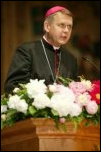
|
 |
» 11/27/2008 17:24
KAZAKHSTAN Kazakh parliament passes law that severely restricts religious freedom All unauthorised religious activity is banned, even meeting to pray or do charity work. Offenders will be severely punished. OCSE, which had asked for further consultation, expresses its “disappointment”. Representatives of various religious groups express their views and concerns about the law.
Janez Lenarcic, head of the OSCE's Office for Democratic Institutions and Human Rights (ODIHR), expressed his “disappointment” for the adoption of a law that did not make “full use of broad consultations with civil society and expertise from the international community.” “We hope the President of Kazakhstan will use his constitutional power” to stop and have the law vetted again, he said. This would send a “positive signal” ahead of Kazakhstan's chairmanship of the OSCE in 2010. “It is very strange that the Justice Ministry asks for a new review from the OSCE and then parliament adopts the law,” human rights activists Yevgeny Zhovtis told the Forum 18 news agency. "I'm very disappointed. This law is not in conformity with OSCE or any other international norms” and will “take Kazakhstan back to Soviet times. [. . .] Its way of controlling religious communities is absolutely terrible.” The new law, which was passed by the lower house of parliament by a unanimous vote, bans all unauthorised religious activity as well as the expression of unauthorised religious beliefs. An authorisation will be needed to conduct missionary activity or import religious texts. Small “religious groups” will only be allowed to carry out religious activity with existing members but cannot maintain any places of worship “open to a wide access.” As for groups that are already registered, they must be authorised again. This would be the death knell for Baptist Churches which have refused on principle to seek legal status and have already been heavily penalised for this. Last month for example, Pastor Andrei Blok was sentenced to 150 hours of compulsory labour in the Akmola Region for refusing to pay fines imposed on him for leading unregistered worship. The law also calls for tougher penalties on anyone involved in unauthorised religious activity, including missionary activities or charity work. According to Baptist Pastor Yaroslav Senyushkevich, “it will be like under Stalin.” Archbishop Tomasz Peta (pictured) was more measured in his reaction. “We hope that the president won't allow Kazakhstan after 17 years to return to the path of restrictions on religious freedom,” he said. Instead Nurym Taibek of the Ahmadi Muslim community does not mince his words. “This law,” he said, “clearly violates our constitution, the course the president has set out, OSCE and other human rights commitments.” By contrast for Kazakhstan's Chief Mufti Absattar Derbisali, the law “is very positive” and can be used against the “many sects” that “have caused very many problems in families”. For his part Aleksandr Ivlev of the Russian Orthodox Church in Almaty is cautious, and has decided to postpone any comment until after it comes into effect to “better know it”. |
URL : www.asianews.it/index.php?l=en&art=13872&size=A |
 del.icio.us
del.icio.us digg
digg Facebook
Facebook Fark
Fark Furl
Furl Ma.gnolia
Ma.gnolia NewsVine
NewsVine Reddit
Reddit Simpy
Simpy Spurl
Spurl StumbleUpon
StumbleUpon TailRank
TailRank
 Astana (AsiaNews/F18) — Kazakhstan’s parliament yesterday adopted a new law on religious freedom despite a request by the Organisation for Security and Co-operation in Europe (OSCE) to have the original bill changed. The country’s religious minorities (Catholics, various Christian groups and Ahmadi Muslims) are concerned of what the new legislation might mean for them.
Astana (AsiaNews/F18) — Kazakhstan’s parliament yesterday adopted a new law on religious freedom despite a request by the Organisation for Security and Co-operation in Europe (OSCE) to have the original bill changed. The country’s religious minorities (Catholics, various Christian groups and Ahmadi Muslims) are concerned of what the new legislation might mean for them.